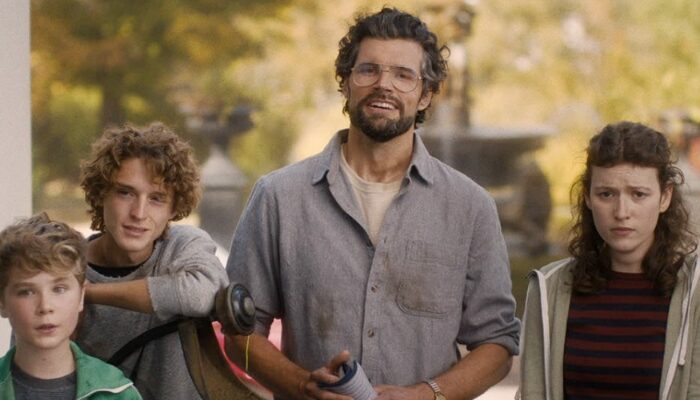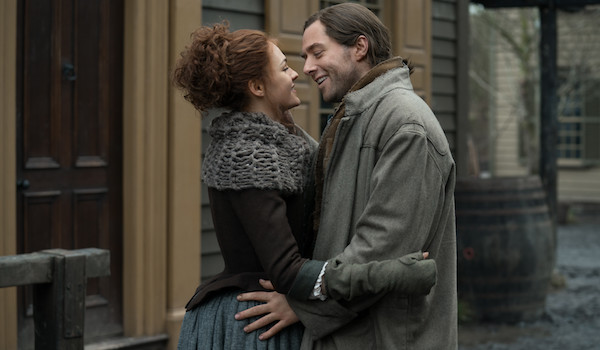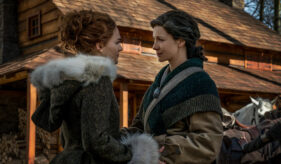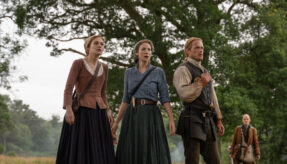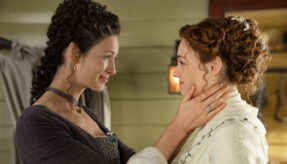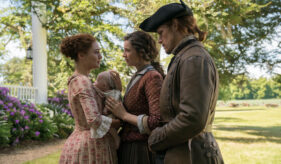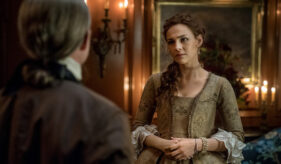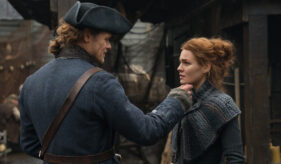TV Review: OUTLANDER: Season 4, Episode 8: Wilmington [Starz]
Outlander Wilmington Review
Starz’s Outlander: Season 4, Episode 8: Wilmington is the one of the most devastating, if not the most devastating, episodes of the television series-to-date. The viewer can think of Outlander episodes that come very close to the emotional impact of Wilmington: To Ransom a Man’s Soul, Surrender, and Faith but Wilmington is in a stratum by itself.
What sets Wilmington apart is a well-executed subversion of expectations. First, the viewer doesn’t expect what happens to Brianna “Bree” Randall Fraser (Sophie Skelton) to happen to her, especially when one considers the parallel it has to what befell her biological father i.e. it’s too ironic. Second, the viewer expects for Brianna to get out of the rape situation like her mother did numerous times or for someone or something to intervene. No one and nothing does in Wilmington, hence the rape scene’s subversion and terrible resplendence.
The aforementioned two factors, especially the latter, leads to a scene that stays with the viewer long after the rape scene ends and Wilmington fades to black.
There is no longer any doubt – Stephen Bonnet (Ed Speleers) is the new main villain of Outlander.
Unlike the modern society that Brianna Randall came from, the wolves roam out in the open, in plain view for everyone to see in 1767 America but since there is no police force (sheriffs, marshals, and so forth do exist), there are very few people able to collar, cage, or kill these predators. Like clandestine insurgents, these predators walk among the populace with no fear of being recognized or apprehended for their crimes. This is the perilous social landscape Brianna Randall dropped herself into when she came back in time, blinded to the omnipresent dangers by the love she feels for her mother and for the father that she has never met.
The setting for the rape in Wilmington is what seems to be a normal tavern and hotel, frequented by normal people and run by what one would assume to be an industrious individual. This is what Brianna Randall thinks when she re-enters the tavern lower-level of the hotel where she is roomed with Elizabeth “Lizzie” Wemyss (Caitlin O’Ryan). Brianna has no idea that a congress of louts has filtered in and that the safe, quaint, rustic tavern and hotel is actually a wolf’s lair. The people gathered around the card table know Stephen Bonnet, his personality, and his proclivities. These men may be the crew from the ship Bonnet sailed with from Scotland, the hooligans that he robs with in America, or they may be one and the same. Whomever they are, during the rape of Brianna Randall, these people have not a shred of an emotional reaction to it. They have heard this “music” before, numerous times most-likely, and are ambivalent to its singer and the situation that the song bird finds herself in.
The rape scene’s brilliance is in its execution. Cinematographer Stijn Van der Veken and writer Luke Schelhaas keep the camera outside of the room where the rape takes place, with those that hear what is happening and couldn’t care less. This decision was made because the viewer has already been inside that room once before during To Ransom a Man’s Soul. There is no need to re-traipse trodden ground. Wilmington “soldiers on” into new territory in Outlander with its sexual assaults, once again proving that no one is safe in the Outlander universe, making the series profoundly better than it would be if all the heroes had invisible force fields around them.
Innocuous, small details prove to be screwdrivers during Brianna Randall’s sexual assault in Wilmington. One such small detail are Brianna’s boots, which are ripped off and thrown out of the room where the rape occurs. During the rape, as Brianna is pleading for help and other “noises” begin emanating from the room, someone, perhaps an employee of the tavern/hotel, collects the boots and stacks them neatly outside the door to the room. The commotion in the other room nothing more to the worker bee than another chamber pot that he will have to scrub later e.g. nothing of consequence.
It is small details like these that make the rape scene in Wilmington more than the degradation of another human being or rape-as-theater. It makes the rape a small exposé on the current time period of Outlander, illustrating that America is not for a second to be believed to be an untouched, utopia-like land. America the Beautiful proved that point in a resounding way and then there is the pesky element of slavery throughout the country. Through Wilmington and its ending, America during 1767 is not only a place to be weary, it’s the wild west, a place to always have a shivering, mortal fear of.
By the time the rape of Brianna Randall concludes in Wilmington, the tavern portion of the hotel is almost empty. This is a very curious turn of events. During the rape, the people around the card table (and the tavern) act as though nothing out of the ordinary is going on yet few of them want to be present during the aftermath of the rape. The ones that left may not have wanted to see the disheveled, raped Brianna Randall emerge from the side room of the tavern/hotel. Would the expression on Brianna Randall’s face have turned their stomachs? Would they feel the annoyance of shame as she looked upon them with tears in her eyes?
Outlander, the TV series, is now as raw and unforgiving as the book series Game of Thrones is based on, A Song of Ice and Fire. Where Game of Thrones has become watered-down with certain types of violence within the almost lawless time period it presents, Outlander has now stepped up to and surpassed Game of Thrones in realism, with a level of prerequisite sexual brutality naturally associated with a primitive era.
When Roger Wakefield MacKenzie (Richard Rankin) finally finds Brianna Randall, before the rape, in Wilmington, their reunion is what one would expect: previous arguments under-the-bridge and love on display in its many, varied forms. Did love, or the moment, or the circumstances of their reunion make Brianna Randall want to marry Roger MacKenzie? I believe it is a mixture of all these elements. For a brief moment, Roger MacKenzie and Brianna Randall both get their fondest wish from the other. The viewer feels the characters bubbling emotions and feels shreds of that happiness in themselves, a credit to the level of acting and character immersion by the actors in the scenes.
When Roger and Brianna get in the way of Roger and Brianna once more, after their temporary marriage and consummation in Wilmington, with Brianna speaking with spite “No one is stopping you”, there is a scream that can be heard from a multitude – “Stop. Please stop. Don’t ruin this.” Brianna doesn’t hear these words, doesn’t feel their sting, until Roger has gone, and she is once again alone but this time, not in a disrupted relationship but in the graveyard of one.
Dr. Claire Beauchamp Randall/Fraser (Caitriona Balfe) is confronted by 1767 American male ignorance in Wilmington and conquers it in resounding fashion. Claire Fraser’s certainty, her command of the surgical situation, and her prowess quickly silences all opposition to a woman conducting a major medical procedure. The look on the faces of the physicians as they witness the fruits of Dr. Fraser’s handy-work is humorous. They can’t find fault with the faultless and the theater-goers, who are given a “show” like no other, clap with a communal brava.
The George Washington situation that James “Jamie” MacKenzie Fraser (Sam Heughan) creates in Wilmington, when Jamie helps Murtagh Fitzgibbons Fraser (Duncan Lacroix), will have to be dealt with in the upcoming episodes of Season 4 decisively and quickly or American history may be changed for the worse.
Leave your thoughts on this Outlander Wilmington review and this episodes of Outlander below in the comments section. Readers seeking more Outlander can visit our Outlander Page, our Outlander Twitter Page, and our Outlander Facebook Page. Readers seeking more TV show reviews can visit our TV Show Review Page, our TV Show Review Twitter Page, and our TV Show Review Facebook Page. Want up-to-the-minute notification? FilmBook staff members publish articles by Email, Twitter, Facebook, Instagram, Tumblr, Pinterest, Reddit, and Flipboard.
Related Articles
FilmBook's Newsletter
Subscribe to FilmBook’s Daily Newsletter for the latest news!

